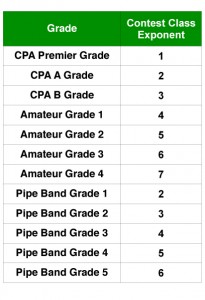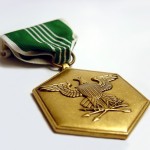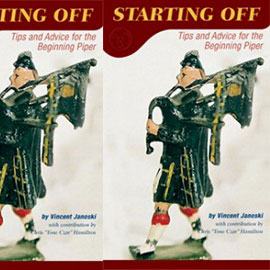Hacking the Bagpiping Judge Part III: How You Can Be a Bagpiping Judge—The System Explained
 Anyone can be a piping or drumming judge. Think about that idea for a moment and take note of your conditioned, reflexive reaction to it. If you’re like most bagpipers and drummers who were born and bred here in the eastern US, the idea might come across as almost laughable. But in all seriousness, why can’t everyone be given a fair chance to judge piping, drumming , or pipe bands if they so choose?
Anyone can be a piping or drumming judge. Think about that idea for a moment and take note of your conditioned, reflexive reaction to it. If you’re like most bagpipers and drummers who were born and bred here in the eastern US, the idea might come across as almost laughable. But in all seriousness, why can’t everyone be given a fair chance to judge piping, drumming , or pipe bands if they so choose?
The system in use to select and certify adjudicators in the EUSPBA is designed so as to ensure that not anyone can be a piping or drumming judge save those deemed to be most qualified and capable. But as discussed in Parts I and II of this series, the system guarantees that it selects the same folks who represent a limited experience with a singular point of view when it comes to bagpipe competition and music. Very few new additions are seen as the years go by chiefly because the requirements are too unrealistic to be met by anyone and therefore must be compromised in some way with each new candidate, thereby undermining their effectiveness in selecting the desired qualified candidates in the process.
Poor quality piping makes a statement about the demands and expectations placed on players and bands by the judges who dutifully evaluate us on the pitch as much as anything. If the quality of play in competition is to change here in the east, what we need is an influx of different points of view among those who evaluate those same competitions. To do that, the system for selecting and certifying adjudicators needs to change in order to allow folks with broader and more varied backgrounds to hold a clipboard and scoresheet.
If you’ve been following along with Part I and Part II of this series, you’ll be wondering what kind of piping and drumming adjudicator selection system can adequately replace the current system we have here in the eastern USA. As mentioned, what is in use now is a system that has the unfortunate byproduct of literally locking out more than qualified individuals—individuals who might bring a welcome and differing viewpoint—from ever sitting on the panel.
A new adjudicator selection and certification system, one centered on a candidate’s résumé of real world piping and drumming experience and achievements, would correct that. Think about that again, for a moment. “Real world piping and drumming experience.” Real achievement does not fit into a narrowly defined requirement such as “10 years at the Grade 1 band level” or “10 years as a professional soloist.” Real achievement is what it suggests: accomplishments of merit regardless of years spent at whatever level of play and accolades granted no matter where you received your tuition or experience. Those achievements suggest that the individuals concerned have attained a certain level of expertise and knowledge. Let’s be clear, we’re talking about any level of play. Achievement is achievement. Granted, some achievements may have higher value than others, but the achievement is what it is and should be considered accordingly. Likewise, some individuals have a great amount of years of activity with many students achieving great things as well. But all of that is also part of “real world achievement.”
Under a new system to select qualified judges considering their real world achievement, we would need some way of “grading” or scoring their achievements. Each piper’s competitive prize accomplishment and experience level would need to be weighed accordingly as well to reach an end score that would either qualify or disqualify them from sitting on our hypothetical adjudicators panel. Thus, the simple formula to derive a score to sit on our panel would be the relative weight of the achievement or prize discounted by the number of years of experience.
(prize weight) X (experience ratio) = achievement score
Each individual would list their top five achievements, score each of them using this formula, and simply add the scores together. The best achievement score would end up being the lowest sum possible when the top five scores are added. Those who rank with the lowest scores would sit at the top of the list of those who qualify to be a judge.
So, how do you calculate the variables in the formula? The “prize weight” is derived by rating the grade or class of competition at which the relative prizes were won and simply multiplying that by the prize placing that was taken at the contest. Thus
The exponent “contest class” would simply be a rating of the grade held at whatever contest is being scored as shown in the table at left.
Naturally, first places at the premier level will give lowest score and thus the lower prize weight. Lower grades and placings below first, though still significant, would derive a higher multiplier in the final calculation. It should be clear by now that the elements that go into figuring one’s total achievement score are not limited to just achievements at the highest grade levels. Mid- to lower-range grade level achievements are ranked and weighted accordingly, all factoring into the total. Anyone who has achieved some amount of success can be scored and be listed for consideration on the new judges panel.
Classifying contests/prizes is the tricky part. The exponent to determine the prize weight is the most important aspect of this formula—as it is the important part of the résumé. It is only possible to begin at “1” and thus derive the lowest score. But all contests are not created equal. The World Pipe Band Championships would be considered a quintessential contest. A win there is a unique achievement. If such a prize were part of a candidate’s resume, then the exponent would be automatically 1 less than that on the classification table.
There is some subjectiveness here, but I think we can all agree that certain contests are a step above the rest. A prize at the Northern Meeting at Inverness (a quintessential contest) does not have the same weight as a prize at the Capital District Scottish Games in Altamont, NY. Likewise, a leadership role in a pipe band that achieves significant prizes is not the same as the rank piper who plays in the same band.
What about general experience and time? More about that and the system applied in “Hacking the Bagpiping Judge Part IV: How to Be a Piping Judge—The System Applied.”
 Pipehacker
Pipehacker









